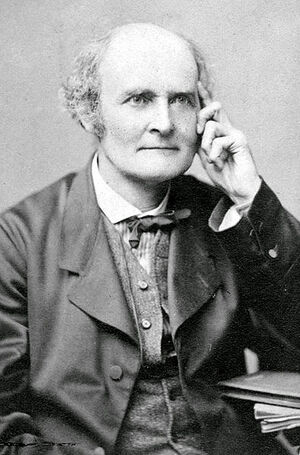Arthur Cayley (nonfiction): Difference between revisions
No edit summary |
No edit summary |
||
| Line 17: | Line 17: | ||
* [[H. F. Baker (nonfiction)]] - Student | * [[H. F. Baker (nonfiction)]] - Student | ||
* [[Carl Wilhelm Borchardt (nonfiction)]] | |||
* [[Cayley's mousetrap (nonfiction)]] | * [[Cayley's mousetrap (nonfiction)]] | ||
* [[George Cayley (nonfiction)]] - Cousin | * [[George Cayley (nonfiction)]] - Cousin | ||
Revision as of 20:27, 21 February 2018
Arthur Cayley F.R.S. (/ˈkeɪli/; 16 August 1821 – 26 January 1895) was a British mathematician. He helped found the modern British school of pure mathematics.
As a child, Cayley enjoyed solving complex maths problems for amusement. He entered Trinity College, Cambridge, where he excelled in Greek, French, German, and Italian, as well as mathematics. He worked as a lawyer for 14 years.
He postulated the Cayley–Hamilton theorem—that every square matrix is a root of its own characteristic polynomial, and verified it for matrices of order 2 and 3.
He was the first to define the concept of a group in the modern way—as a set with a binary operation satisfying certain laws. Formerly, when mathematicians spoke of "groups", they had meant permutation groups. Cayley's theorem is named in honor of Cayley.
In the News
Fiction cross-reference
Nonfiction cross-reference
- H. F. Baker (nonfiction) - Student
- Carl Wilhelm Borchardt (nonfiction)
- Cayley's mousetrap (nonfiction)
- George Cayley (nonfiction) - Cousin
- Andrew Forsyth (nonfiction) - Student
- William Hopkins (nonfiction) - Academic advisor
- Mathematician (nonfiction)
- George Peacock (nonfiction) - Academic advisor
- Charlotte Scott (nonfiction) - Student
- James Joseph Sylvester (nonfiction) - Friend
External links:
- Arthur Cayley @ Wikipedia
